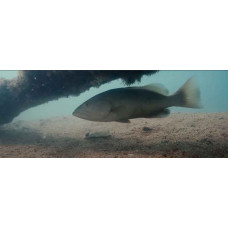Latin name
Mycteroperca microlepis
Other names
Сharcoal belly; French: badèche baillou; Portuguese: badejo-daareia; Spanish: cuna aguají.
Identification
Pale to dark gray or sometimes olive gray, the larger gag is darker than the smaller gag and has blotchy markings on its side and an overall indistinctly marbled appearance. The smaller gag is paler and has many dark brown or charcoal marks along its sides. The pelvic, the anal, and the caudal fins are blackish, with blue or white edges. The gag is distinguished from the black grouper by its deeply notched preopercles and is distinguished from the otherwise similar scamp by the absence of extended caudal rays.
Distribution
In the western Atlantic, grouper are found from North Carolina (sometimes as far north as Massachusetts) to the Yucatán Peninsula. They are rare in Bermuda and absent from the Caribbean and the Bahamas. They are reported along Brazil. Gag are the most common grouper on rocky ledges in the eastern Gulf of Mexico.
Habitat
Young gags inhabit estuaries and seagrass beds. Adults are usually found in the sea near rocky ledges, undercuts, reefs, and sometimes in the coastal zone on rocky or grassy bottoms. Adults may be solitary or occur in groups of 5 to 50 individuals.
Size
The gag weighs less than 3 pounds on average but may reach a weight of 55 pounds (about 51 inches in length). It can live for at least 15 years.
Life history and Behavior
They spawn off the Carolinas in February and from January to March in the Gulf of Mexico.
Food and feeding habits
Gags feed on such fish as sardines, porgies, snapper, and grunts, as well as on crabs, shrimp, and squid; young that are less than 20 centimeters feed mainly on crustaceans found in shallow grassbeds.
Reproduction
Gag reach sexual maturity at the age of 5-6 years 27-30 inches in length. A female can lay more than a million pelagic eggs.
| Classification | |
| Phylum | Chordata |
| Class | Actinopterygii |
| Squad | Perciformes |
| Family | Serranidae |
| Genus | Mycteroperca |
| Species | M. microlepis |
| Features | |
| Conservation status | Vulnerable |
| Habitat | Littoral |
| Life span, years | 31 |
| Maximum body weight, kg | 36.5 |
| Maximum length, cm | 145 |
| Sailing speed, m/s | No information |
| Threat to people | Edible |
| Way of eating | Predator |
Gag
Tags: Gag



